'It was 3 hours of magic': Spectacular auroras thrill stargazers across the world (and internet) as intense geomagnetic storm batters Earth (photos)
"It was three hours of magic."
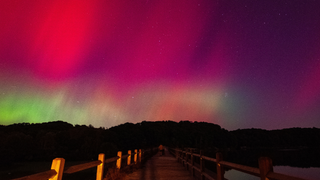
A geomagnetic storm supercharged Earth's auroras, or the northern lights overnight on Thursday (Oct. 10), with aurora watchers in the U.S. and across the globe on hand to capture the stunning light-show. Not to be left out, Space.com's own crack team of aurora hunters (the A-Team?) were also out in the field to catch some incredible images.
According to the National Oceanic and Atmospheric Administration (NOAA) Space Weather Prediction Center (SWPC), the geomagnetic storm resulted from Earth being struck by an eruption of charged particles or "plasma" that burst from the sun, more specifically sunspot AR 3848 in the evening of Tuesday (Oct. 8).
The plasma eruption from the solar flare, an example of a "coronal mass ejection" or "CME," traveled to Earth at speeds of 2.9 million mph (4.6 million kph). That's about 2,000 times as fast as the top speed of a Lockheed Martin F-16 jet fighter. Yet, even at these incredible speeds, the CME still took a few days to travel the 93 million miles (150 million km) between Earth and the sun.
When the CME struck Earth's magnetosphere, the resultant geomagnetic storm reached G4 levels on the SWPC's geomagnetic storm scale. This is the second highest grade on the scale, which considers both severity and potential impacts. NOAA stated on Thursday evening that the storms have the potential to reach extreme G5 levels.
Related: Severe solar storm could supercharge auroras across US, impact power grids, NOAA warns
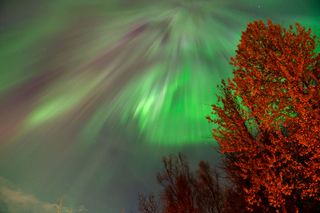
While a common sight in Alaska and neighboring regions in the U.S. (as seen above) the G5 status of this geomagnetic storm ensured the Aurora Borealis was visible to many other Americans last night.
Space.com's own Josh Dinner was on hand to capture colorful images of the aurora over Griffey Lake in Bloomington, Indiana, on Thursday night at 10:10 pm EDT (0310 GMT).
Get the Space.com Newsletter
Breaking space news, the latest updates on rocket launches, skywatching events and more!
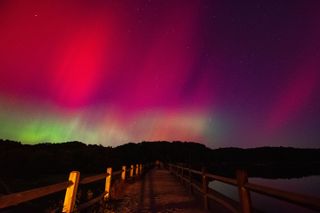
"A small number of people began gathering along the levy walkway beside the Indiana reservoir shortly after sunset. There was a faint pink glow as the twilight slipped to darkness, and then suddenly, the sky erupted with a vivid pink and green dance above our heads," Dinner explained. "It only lasted a minute or so, but it could be seen with the naked eye.
"I was absolutely mesmerized."
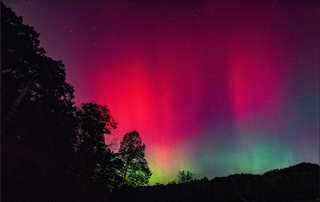
Rural areas weren't the only ones treated to auroral light shows. Skywatchers also caught images of the northern lights over some awe-inspiring man-made structures. For example, the following image shows the aurora borealis manifesting over the Tappan Zee or Governor Mario M. Cuomo Bridge near New York City early Friday morning (Oct. 11).
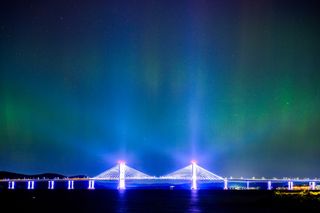
The aurora was visible, albeit fainter over the entire skyline of New York City in another image captured early Friday morning. Though visible only as a smear of color, the image shows the vast dome-like shape of the magnetosphere.
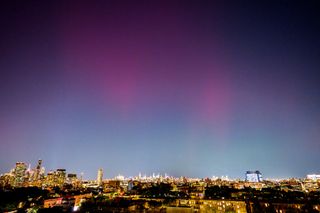
Metrologist and Space.com contributor Joe Rao was able to ctach some incredible images of the Northern Lights from Putnam Valley, New York.
"We had a grand view of the Northern Lights tonight (Thursday, 10/10) from here in Putnam Valley," Rao said. "The show began as soon as the sky got reasonably dark at around 7:30 p.m. EDT."
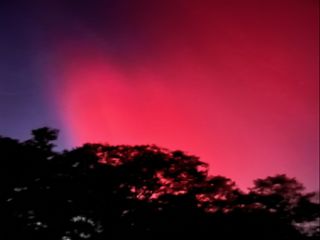
As the above image shows the predominant color seen by Rao was a deep red, but closer to the northern horizon, he added that he could see faint whitish rays protruding upward.
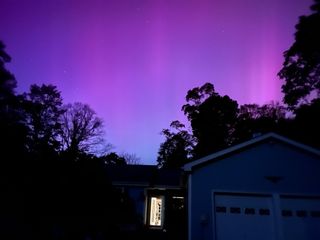
Astrophysicist and the host of the TV show Cosmos, Neil deGrasse Tyson, viewed the aurora from Long Island, NY, the Aurora this evening. The famous science communicator shared the images on his X feed, writing: "Caused by charged solar particles arriving at Earth from yesterday's solar flare. They slam into atmospheric molecules of Oxygen and Nitrogen, rendering them a glow. Here, Red and Green are visible, with the Big Dipper looking on."
From Long Island, NY, the Aurora this evening.Caused by charged solar particles arriving at Earth from yesterday's solar flare. They slam into atmospheric molecules of Oxygen and Nitrogen, rendering them a-glow. Here, Red and Green are visible, with the Big Dipper looking on. pic.twitter.com/wgzCIiJUHuOctober 11, 2024
The northern lights was also visible in muted form for Space.com Editor-in-Chief Tariq Malik, who headed to Painter's Point at New Jersey's South Mountain Reservation in Milburn to join a small crowd of aurora hunters.
"The night chill didn't bother the dozens of skywatchers, who kept their eyes fixed to their Aurora app in the hopes of glimpsing the Northern Lights. Sadly, light pollution made for no visible auroras while Space.com was there, but we did catch a glimmer of red and green using a mobile phone camera," Malik said. "The arrival of a local sheriff, who reminded the onlookers that the park was closed and they could all be ticketed, ended the observing session for most of us by 10:30 pm EDT."
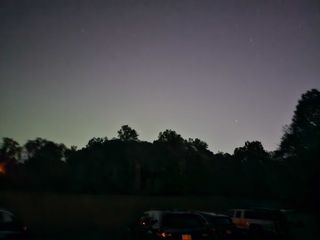
Skywatchers weren't just catching incredible aurora images from terra firma, however. Clouds weren't an issue for those above them like science influencer Astro Alexandra caught incredible images of the aurora from the air as she traveled from Atlanta to Denver on Thursday evening. She shared them on her X feed, which is used for space science communication.
"I am in AWE," Astro Alexandra wrote. "I took a flight from Atlanta to Denver, thinking I would be too far south to see anything. Three hours of magic."
I am in AWE. I took a flight from Atlanta to Denver thinking I would be too far south to see anything. Three hours of magic. pic.twitter.com/ZrXX29MlNTOctober 11, 2024
Also in the air, this time over Canada, airline pilot Elisabeth Jackson was able to catch the auroras from the flight deck of an aircraft as it headed East from Winnipeg International Airport to Toronto Pearson International Airport. She also shared the images on her X feed.
The aurora borealis from FL330 heading east between YWG and YYZ 10OCT2024 pic.twitter.com/6NrQbp5PsZOctober 11, 2024
The aurora was also visible over Europe. The UK's Met Office hailed the arrival of the striking light show across the Atlantic on its official X feed. The images were captured by meteorologists across the UK.
The aurora has been visible across many parts of the UK this eveningHere are some photos taken by our meteorologists situated across the country pic.twitter.com/pTvGTuRqWKOctober 10, 2024
Xavier Calmet is a classical and quantum Gravity researcher at the University of Sussex in the UK. On Thursday evening, he captured a stunning image of the auroras over his home, which he shared on his X feed.
"Auroras are the most awesome natural phenomena I have ever seen. Besides their natural beauty, there is a lot of interesting physics behind it, from astrophysics to atomic physics and particle physics," Calmet told Space.com. "It was only the second time I saw one."
This occasion was especially remarkable for Calmet, who got to share it with a first-time aurora hunter.
"This time, I got to share this amazing spectacle with my youngest son, Cédric," Calmet continued. "I don’t think that he will ever forget it."
Congratulations on your first aurora Cédric!
pic.twitter.com/Uggh83AHvCOctober 10, 2024
Also in the UK, X user Veronica in the Fens caught an expansive image of the aurora as it stretched over Ely Cathedral in Cambridgeshire, writing simply, "Wow."
Wow 🤩 now over @Ely_Cathedral 🩷🩷Ely, Cambridgeshire #Auroraborealis #northerlights #aurora pic.twitter.com/74NlSNPeHKOctober 10, 2024
Usually based in the UK, Space.com's reference editor and unofficial aurora chaser Daisy Dobrijevic has already ventured to Norway to view auroras with The Northern Lights Company when the CME hit Earth. Dobrijevic was able to catch some powerful images of the geomagnetic storm-boosted Northern Lights.
"I am thrilled to have been treated to such a delightfully dreamy Northern Lights display while aurora-hunting with The Northern Lights Company," she said.
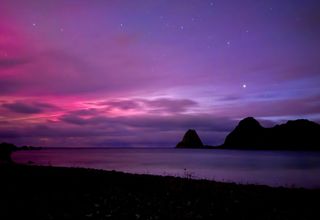
"It was a race against the clouds, and the clouds eventually won, but to
catch just a glimpse of the show was simply sublime. Our tour director Chris Percival beat all the odds and managed to find us one of the few spots in the area with a clearer view of the sky, a small beach near Nykvåg, Norway," Dobrijevic, who shot her images with an iPhone 16 pro, explained. "Listening to the waves crash along the shore and watching the delicate aurora glow above was a very surreal experience."
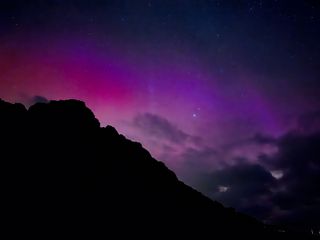
X user Sylain captured startlingly colorful images of the aurora over Cap Gris Nez, on the coast of northern France. Quelle spectacle indeed!
Nuit magique au Cap Gris nez !Des aurores visibles a l'oeil nu Quelle spectacle !#AuroresBoréales #auroresboreales #Auroraborealis #auroreboreale #northernlights #France pic.twitter.com/i4F1D3wiMCOctober 11, 2024
Further East, the Northern Lights were captured on the rise over the Jinshanling Great Wall in Daqing, Heilongjiang Province of northern China.
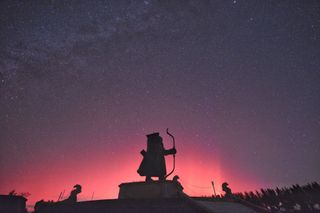
These stunning auroral displays are expected to continue into the evening of Friday (Oct. 11) as CME plasma continues to belt Earth, providing the opportunity for more stunning and colorful images of the sky.
"I can’t wait to see what tomorrow night brings!" Space.com's aurora hunting editor Daisy Dobrijevic concluded.
Editor's Note: If these images of the aurora have you light-show hunting, you can share your images of the Northern Lights by sending them along with comments to our skywatching inbox at spacephotos@space.com.
Join our Space Forums to keep talking space on the latest missions, night sky and more! And if you have a news tip, correction or comment, let us know at: community@space.com.

Robert Lea is a science journalist in the U.K. whose articles have been published in Physics World, New Scientist, Astronomy Magazine, All About Space, Newsweek and ZME Science. He also writes about science communication for Elsevier and the European Journal of Physics. Rob holds a bachelor of science degree in physics and astronomy from the U.K.’s Open University. Follow him on Twitter @sciencef1rst.